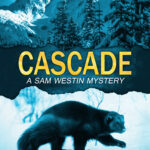I am so pleased to welcome author Pamela Beason, who’s agreed to share how the lessons learned as a PI show up in her writing! Pamela is a versatile and productive author and a great writers’ conference roommate! Be sure to look for her latest novel, Cascade. Here’s what Pamela has to say:
I worked as a private investigator for ten years in Washington State. Now that I have turned my attention to writing mysteries, some readers are surprised that I don’t write mysteries with a private investigator protagonist. One reason for that is that I began to write my fictional mysteries while I was still doing investigation work, and I did not want to be accused of publishing details of real investigations or the real people involved in those cases. Discretion is everything in the PI biz; you can easily lose your license if you develop “loose lips.” I’ve just published Cascade, my 14th novel, and none of my stories involves cases that I was involved in.
That said, my many years of doing investigation work do affect my writing. I learned a lot as a PI. Here are some of the main ideas that go into my books.
Law Enforcement Officers Are … well, People
Whether you’re talking to law enforcement, a witness, or a criminal, you need to begin with an open mind. Some police officers are mean, some are pussycats, some are hot-headed, some are unfailingly polite. Some are relatively uneducated, others have master’s degrees and specialties within law enforcement. Every officer is an individual and every department has its own practices and culture. Patrol cops get their assignments from 911 dispatchers, who get their details from the person who calls 911. This process sometimes goes seriously off the rails. The person who calls may not have interpreted a situation correctly, but the original report gets passed on. So, a patrol officer may arrive on scene believing a burglary is in progress when the “burglar” is actually a friend who let himself in to water the plants while the homeowner is on vacation. When I write a story, I try to start at the beginning of the situation and imagine how things can go seriously wrong.
In my Neema mysteries, Detective Matthew Finn tries to avoid the public humiliation he would receive if it became known that he sometimes receives clues from signing gorillas. It’s bad enough that everyone in the gossipy small town knows that his wife ditched him to run off with a local college professor.
Criminals Are … well, People, Too
Law abiding citizens would all like to think that we can easily distinguish criminals. Obviously, that’s not the case, or so many people would not fall for so many scams. I’ve talked to criminals who are very charming and funny. I’ve talked to juveniles who did stupid things. And I’ve talked to a few who are downright scary. What do all these people have in common? They usually have a justification for committing a crime. The rent was due, so they robbed the convenience store to get the money. They needed guns to protect their drug stash from thieving drug addicts. It can be hard to keep a straight face when interviewing these folks. They’re sometimes mystified why the rest of us question the logic of their behavior. I try to create criminals of all sorts in my books.
Witnesses Are … You Guessed It … People
We all interpret things through lenses colored by our own experiences. I’ve worked on a case where the witness misinterpreted a scene with a teenage couple (a large boy, a very petite girl) playing around at a bus stop. The boy kept putting his arms around the girl and picking her up off the ground. The witness, who was watching from a restaurant window, reported an assault. It turned out that the witness had teenage daughters he constantly worried about. The responding female police officer refused to believe the teenage girl when she said she was just fooling around with her boyfriend. The officer insisted that the girl was abused and afraid to say so. I talked to her at length, and she was a tough cookie, and beyond frustrated that the officer kept insisting she was lying. I still don’t know if the poor boy was charged or not.
People make all kinds of assumptions based on what a person is wearing or driving or carrying, or what sort of job they have. My book Bear Bait is all about mistaken assumptions.
Our Legal System Is Not a Fair System
If you are ever accused of a crime, no matter how outlandish it may seem, the majority of people who hear about the accusation will assume you are guilty. Private investigators typically work for the defense (the prosecution has police detectives), so in criminal cases, PIs hear this a lot: “Why should I talk to you? You’re trying to help that scumbag!” We have to be experts in assuring people that we just want their story, whatever it may be. Often, the accused is a scumbag. But it’s disturbing how many people who don’t know the story are willing to simply believe whatever they’ve been told.
Then again, we see this every day in politics, don’t we? My book Endangered deals with the issue of how media hype can lead the public to dangerous reactions.
Why does the media malign public defenders? In my opinion, most of these people are saints. They are overloaded with cases, they often have no resources and very little pay, while the prosecution has well-staffed offices and services they rely on. I’ve seen stressed-out public defenders crying in their offices between multiple court appearances. Most of them are doing the best they possibly can. And if you think you’d never need a public defender, consider that defense attorneys generally charge more than $300/hour. How long could you pay those bills? Most middle-class Americans, if involved in a felony case that goes to court, will eventually need a public defender.
Even judges often decide cases based on their own biases.
How does a person who has served his or her sentence start over again? Our society makes it so difficult to get a job and find a place to live that we shouldn’t be surprised that there are so many repeat offenders. In my book The Only Witness, an ex-con is a victim forced to go along with the crime committed by a supposedly upstanding citizen, because who would believe an ex-con’s story of coercion?
Most days, I find it frustrating to live in a world run by humans.
So, my books include a lot of animals. The signing gorillas in my Neema mysteries have no motivations beyond food and play; they are truthful witnesses, but they don’t always interpret what they see as a human would. The wild animals in my Sam Westin mysteries are typically victims threatened by humans, rather than the other way around. I am a hiker, a kayaker, a snowshoer, and occasionally, a scuba diver. Nature abounds, instead of courtrooms and police stations. Personally, even though crimes are always committed in my books, I find that setting much more restful.
Pamela Beason is the author of fourteen suspense novels. She lives in the Pacific Northwest, where she runs outside as often as she can to commune with nature and have a few adventures in the wild. Pamela’s 14th novel is Cascade.
is the author of fourteen suspense novels. She lives in the Pacific Northwest, where she runs outside as often as she can to commune with nature and have a few adventures in the wild. Pamela’s 14th novel is Cascade.  Read more about Pamela and her novels on her website, https://pamelabeason.com.
Read more about Pamela and her novels on her website, https://pamelabeason.com.

Fascinating post. There are so many complexities within the world of private investigations, witnesses, crimes and more. Useful info for this mystery writer! Thank you!